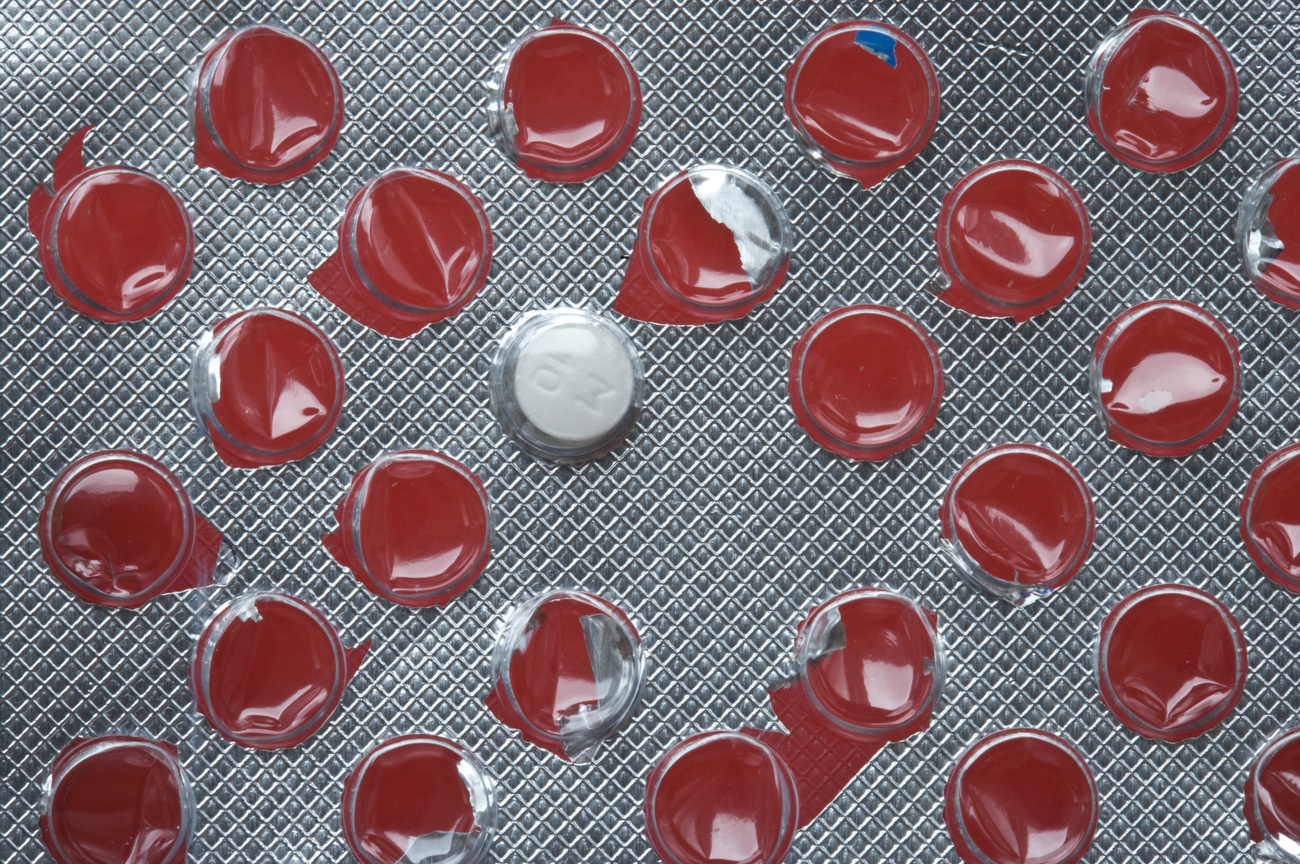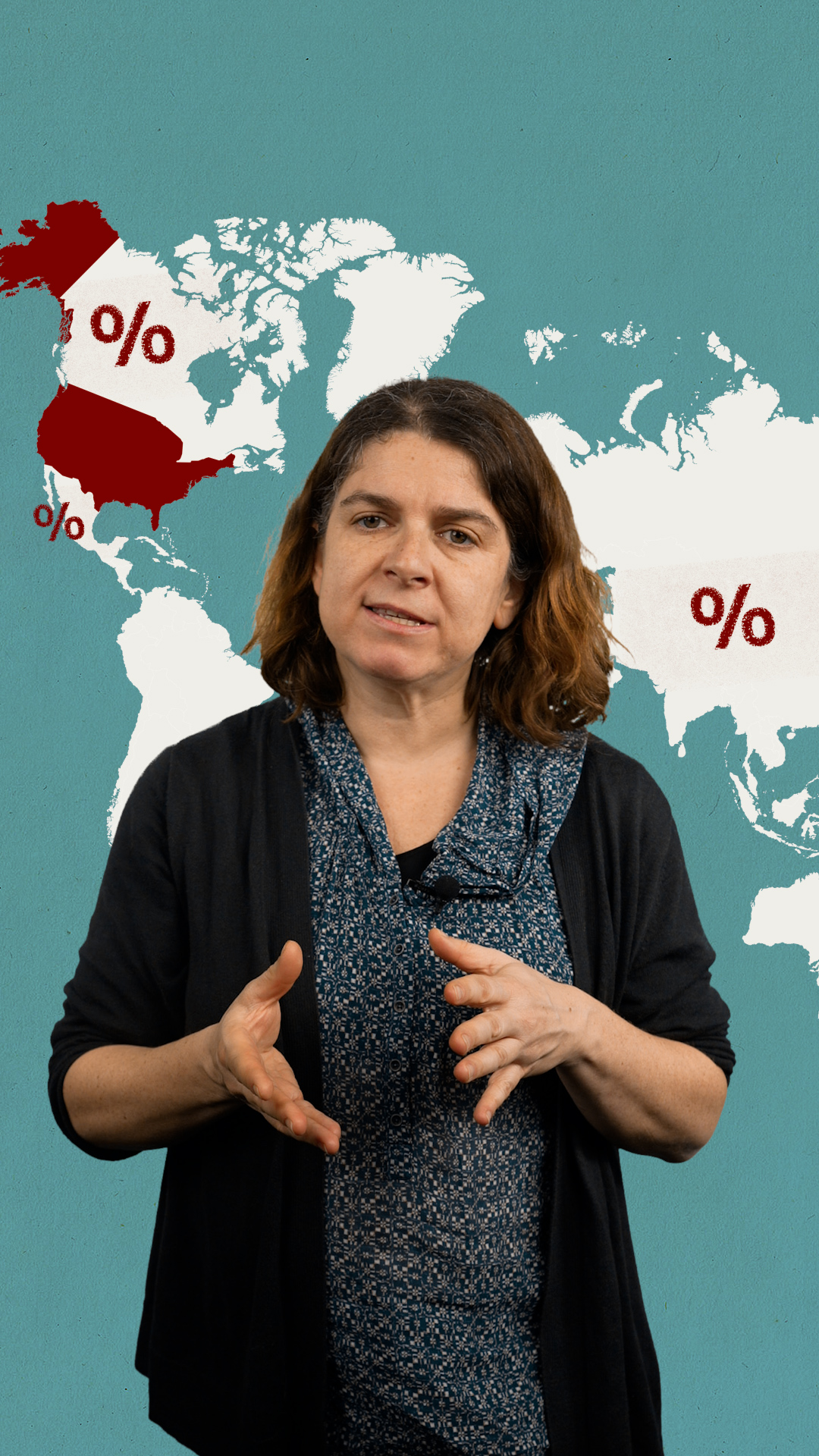US tariffs pressure Swiss pharma powerhouse

Looming US pharma tariffs may hurt patients and the industry, but they could also challenge the status quo in pharmaceutical hubs like Switzerland as investment shifts to the US.
Swiss pharma giants Roche and Novartis both announced billion-dollar investments in the United States in the last few weeks. Neither company mentioned impending tariffs by American President Donald Trump, instead choosing to highlight their long-standing commitment to the US.
But tariffs are the elephant in the room. Experts have suggestedExternal link that the investments are an attempt to subdue Trump’s desire to apply import taxes on pharmaceuticals.

More
Swiss pharma giant Roche to invest $50bn in US within five years
On April 1, the US administration began investigating pharma and semiconductor imports to determine their impact on “national security”. According to the Wall Street JournalExternal link, the investigation could lead to tariffs of up to 25% on pharmaceuticals, their ingredients, and any derivative products, and could be applied as early as mid-May. This is despite the fact that the World Trade Organization – of which the US is a member, but which Trump has threatened to pull out of – has deemed pharmaceutical products exempt from global tariffs.
Pharmaceuticals were among a handful of products excluded from US tariffs announced on April 2 which are currently on a 90-day hold for all targeted 57 countries except China. If the hold is lifted, the US will apply a 31% hike on imports from Switzerland. Swiss government officials recently travelled to Washington to attempt to negotiate the tariffs with the Trump administration.
Slapping tariffs on drugs could be a blow to Switzerland’s pharmaceutical industry. The US represents a significant part of the two big pharma giants’ global revenue, at just over 50% for Roche and around 40% for Novartis.

More
Swiss pharma industry particularly vulnerable to Trump tariffs
Pharmaceuticals account for 40% of total Swiss exports, making it the largest exporting industry. At 60%, over half of those exports are to the US.
This amounted to about $35 billion in pharmaceutical exportsExternal link to the US in 2024. Should the maximum tariff of 25% be imposed, a back-of-the-envelope estimate puts the cost to Swiss pharma companies at around $8.75 billion.
Responding to the tariff threat
Given the hefty costs, pharmaceutical companies are looking for ways around the tariffs. The most obvious is to boost production in the US, which some companies like Roche are able to do using existing facilities. Roche CEO Thomas Schinecker told the media during the company’s first-quarter earnings call on April 24 that four drugs in its portfolio – which Roche declined to name – account for 92% of the company’s tariff exposure.
Production is already sufficient in the US for three of those drugs and the company has started to transfer technology stateside for the fourth, which was never produced in the US.
Roche is only operating at 50% capacity for the production of drug substances in the US, which “gives us plenty of room to scale up manufacturing in the US”, Schinecker explained.
For companies that have more decentralised, globalised manufacturing operations than Roche, avoiding tariffs is expected to be more costly and complicated.
“In the short term, relocating a production site is nearly impossible – ensuring quality, approvals, and building a facility takes at least five to ten years,” said René Buholzer, CEO of Interpharma, the association of Switzerland’s research-based pharmaceutical industry.
In an email to SWI, Novartis didn’t respond to a request about immediate measures it is taking to mitigate effects of tariffs. A company spokesperson told SWI via email that the company’s “planned investment serves as a clear demonstration of our continued focus in the US”.
The recent investment announcements by Roche and Novartis, among other big pharmaceutical companiesExternal link, are a sign that companies are rethinking where they locate production of future drugs based on a wide range of factors, including geopolitics and national security concerns.

More
What is a tariff? A quick guide
Novartis’s $23 billion investment in the US, announced in early April, will set up two innovation hubs, four manufacturing facilities and create 1,000 jobs at the company, so that “all key Novartis medicines for US patients will be made in the United States”.
Similarly, Roche, which already employs 25,000 workers across 24 US sites, announced a $50 billion investment in the US this week. The pharma giant didn’t give a timeline but said that once its new capacity is set up, it will “export more medicines from the US than it imports”.
Growing competition
The pharmaceutical industry’s investments in the US put Switzerland in a difficult position. As the Tages-Anzeiger reportedExternal link on April 23, the Swiss government is keen to show American President Trump that it is making gestures to improve the trade balance with the US.
On the other hand, the announcement of more investment outside of Switzerland adds to worries about the country’s ability to stay attractive to pharmaceutical companies. Switzerland punches above its weight when it comes to research and production of pharmaceuticals, with the industry surpassing banking in terms of its contribution to GDP. About 50,000 people work in the pharmaceutical industry, accounting for 5.4% of the total Swiss workforce in 2022.

More
New York, Beijing, Tokyo – the Swiss government is on a mission to save trade
But with just over nine million people, Switzerland is a small market, which puts it at a disadvantage at a time when companies are increasingly locating production facilities close to customers.
“Over the past years, it’s really been our strategy to make sure that we have a strong manufacturing presence in all the major markets,” said Schinecker. “In fact, it’s been a prerequisite in many of these markets, including in China, to have a local presence, including manufacturing, to get access to the market.”
Roche and Novartis have both invested heavily in research and development, production, and partnerships in China. Roche has signed two licensing dealsExternal link worth around $1 billion with Chinese biotechnology firms in the last two years.
The companies have also made recent investments in Switzerland, but they don’t come close to the combined investment of $73 billion in the US which represents one of the largest pharmaceutical investments in a single country over the last decade.
“Every ten years, major reinvestments are due [in the pharma sector] – the real question is: where do they go? And increasingly, the answer is no longer Switzerland,” said Buholzer, commenting on the companies’ investment plans.
Staying attractive
Amid the tariff pressure, companies are stepping up demands on European governments, including in Switzerland, to improve incentives to keep companies on their shores.
This week, the CEOs of Novartis and French company Sanofi penned a letterExternal link to the Financial Times, asking Brussels to “get it right” so it can attract new pharma investment. “Against a backdrop of waning European biopharma competitiveness, the uncertainty of tariffs is further reducing incentives to invest in the EU,” they wrote.
Pharmaceutical companies have been arguing for years that growing pressure to lower drug prices, delays in drug approvals, and more compliance regulations are making the EU less competitive. Between 2010 and 2022, pharmaceutical R&D spending in Europe grew at an average annual rate of 4.4%, increasing from €27.8 billion (CHF26.1 billion) to €46.2 billion. During the same period, US pharmaceutical R&D spending grew at an average annual rate of 5.5% while China’s rate was 20.7% although it started from a much lower level.
Schinecker agrees that “there’s too much bureaucracy” in Europe which is stifling economic growth. He added that there needs to be investment in “core, future industries,” which include pharmaceuticals and which he says the US and China have recognised.
While the Interpharma head believes tariffs aren’t good for the industry, he also sees this watershed moment as an opportunity to secure better conditions in Switzerland.
“Many countries are now taking targeted measures to increase their attractiveness as a location for life sciences,” said Buholzer, referring to discussions held earlier this monthExternal link between European pharma and biotech lobby groups and the European Commission President Ursula von der Leyen.
He believes Switzerland “needs to develop a clear strategy” for the life sciences, especially under the circumstances.
“Trump’s tariffs hurt both patients and the industry – yet they’re accelerating the shift of investment from Europe to the US,” he said.
What is your opinion? Join the debate:
Edited by Veronica DeVore/ac

In compliance with the JTI standards
More: SWI swissinfo.ch certified by the Journalism Trust Initiative










You can find an overview of ongoing debates with our journalists here . Please join us!
If you want to start a conversation about a topic raised in this article or want to report factual errors, email us at english@swissinfo.ch.